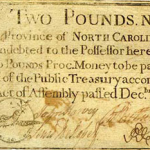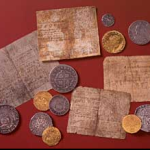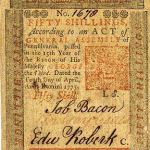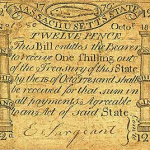Articles in the Currency Act Category
Currency Act, Timeline of British Acts on America »

Definition of the 1764 Currency Act
The 1764 Currency Act was a law passed by British Parliament to regulate the issue and legal tender status of paper money in the colonial economy. This act was an extension of the that applied to New England colonies, the 1764 Currency Act applied the same principles to all British colonies in America.
Why was the 1764 Currency Act passed?
British law banned the minting of coins and the issue of official government money in America. To avoid this restriction colonial governments issued “bills of public credit”, …
Currency Act, Documents »

The following is the original text of the Currency Act of 1751.
WHEREAS the Act of Parliament made in the sixth Year of her late Majesty Queen Anne, intituled An Act for ascertaining the Rate of foreign Coins in her Majesty’s Plantations in America, hath been intirely frustrated in his Majesty’s said Colonies of Rhode Island and Providence Plantations, Connecticut, the Massachusets Bay, and New Hampshire in America, by their creating and issuing, from Time to Time, great Quantities of Paper Bills of Credit, by virtue of Acts of Assembly, Orders, …
Currency Act, Documents »

The following is the original text of the Currency Act of 1764.
WHEREAS great quantities of paper bills of credit have been created and issued in his Majesty’s colonies or plantations in America, by virtue of acts, orders, resolutions, or votes of assembly, making and declaring such bills of credit to be legal tender in payment of money: and whereas such bills of credit have greatly depreciated in their value, by means whereof debts have been discharged with a much less value than was contracted for, to the great discouragement and …
Currency Act, Timeline of British Acts on America »

What was the Currency Act of 1751?
The Currency Act of 1751 prohibited the issue of new bills of credit by New England colonies: Rhode Island, Massachusetts Bay, New Hampshire and Connecticut. Parliament decided to enact the Currency Act of 1751 to control currency depreciation against silver and sterling and to ensure its value for payments of debt to British merchants. extended the policy to all British colonies in the Americas increasing more tension between Britain and America.
Why was the 1751 Currency Act passed?
Most of the hard currency and revenues in …


